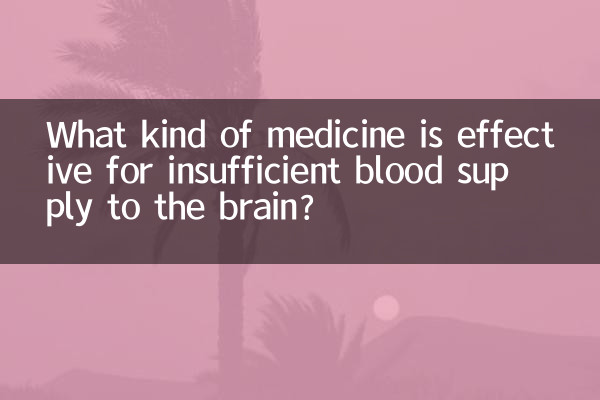What kind of medicine is effective for insufficient blood supply to the brain?
Insufficient blood supply to the brain is a common cerebrovascular disease, which mainly manifests as dizziness, headache, memory loss and other symptoms. In recent years, with the accelerated pace of life and aging, the incidence of insufficient blood supply to the brain has increased year by year. This article will combine the hot topics and hot content on the Internet in the past 10 days to give you a detailed introduction to the treatment drugs and their effects for cerebral blood supply insufficiency.
1. Common symptoms of insufficient blood supply to the brain

There are many symptoms of insufficient blood supply to the brain. Here are some typical symptoms:
| symptom | describe |
|---|---|
| Dizziness | Suddenly feel dizzy, unable to even stand |
| Headache | Persistent or intermittent headache, mostly in the back of the head |
| memory loss | Recent memory has declined significantly, often forgetting what just happened |
| lack of concentration | Decreased work efficiency and easily distracted |
| sleep disorders | Difficulty falling asleep or poor sleep quality |
2. Commonly used drugs to treat insufficient blood supply to the brain
According to recent hot medical discussions on the Internet, the following drugs are effective in treating insufficient blood supply to the brain:
| Drug name | Mechanism of action | Therapeutic effect | Things to note |
|---|---|---|---|
| nimodipine | Calcium ion antagonist, dilates cerebral blood vessels | Improve blood circulation in the brain and relieve dizziness and headaches | Use with caution in patients with hypotension |
| Ginkgo leaf extract | Improve microcirculation, antioxidant | Enhance brain cell metabolism and improve memory | Requires long-term use to be effective |
| aspirin | Anti-platelet aggregation | Prevent thrombosis and reduce the risk of stroke | Pay attention to gastrointestinal reactions |
| flunarizine hydrochloride | Improve vestibular function | Effectively relieve dizziness symptoms | May cause drowsiness |
| Citicoline | Promote brain metabolism | Improve cognitive function and promote neurological repair | Intravenous medication is more effective |
3. Precautions for drug treatment
1.personalized medicine: Different patients have different conditions and constitutions, and appropriate drugs and dosages should be selected under the guidance of a doctor.
2.Combination medication: Severe cases may require a combination of multiple drugs to achieve the best therapeutic effect.
3.long-term persistence: Treatment of insufficient blood supply to the brain usually takes a long time. Patients should take medication on time as directed by the doctor and should not stop medication at will.
4.Regular review: During treatment, blood pressure, blood lipids and other indicators should be checked regularly to evaluate the treatment effect and adjust the plan in a timely manner.
4. Adjuvant treatment methods
In addition to drug treatment, the following auxiliary measures can also help improve cerebral blood supply deficiency:
| method | Specific measures | Effect |
|---|---|---|
| diet conditioning | Eat a low-salt, low-fat diet and eat more foods rich in Omega-3 | Improve blood vessel health |
| moderate exercise | 30 minutes of aerobic exercise every day, such as brisk walking and swimming | Promote blood circulation |
| Traditional Chinese Medicine Conditioning | Acupuncture, massage and other traditional therapies | Relieve symptoms and improve physical fitness |
| psychological adjustment | Maintain a good attitude and reduce stress | Improve nervous system function |
5. Latest Treatment Progress
According to recent medical research hot spots, the following new technologies show good prospects in the treatment of cerebral blood supply insufficiency:
1.stem cell therapy: Promote the repair of damaged nerve cells and improve brain function through stem cell transplantation.
2.gene therapy: Target specific gene targets to regulate cerebrovascular function and improve blood supply from the root cause.
3.neuromodulation technology: Non-invasive treatments such as transcranial magnetic stimulation can effectively improve cerebral circulation.
Conclusion
The treatment of insufficient blood supply to the brain requires a comprehensive consideration of multiple factors such as medications, lifestyle, and psychology. The drugs introduced in this article have significant effects in clinical application, but patients should use them rationally under the guidance of professional doctors. At the same time, maintaining a healthy lifestyle is equally important to prevent and improve insufficient blood supply to the brain. If symptoms persist or worsen, you should seek medical treatment promptly to avoid delaying the condition.

check the details

check the details